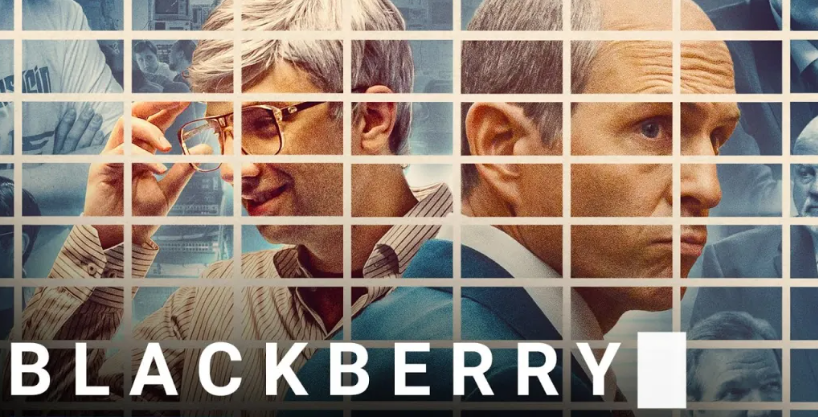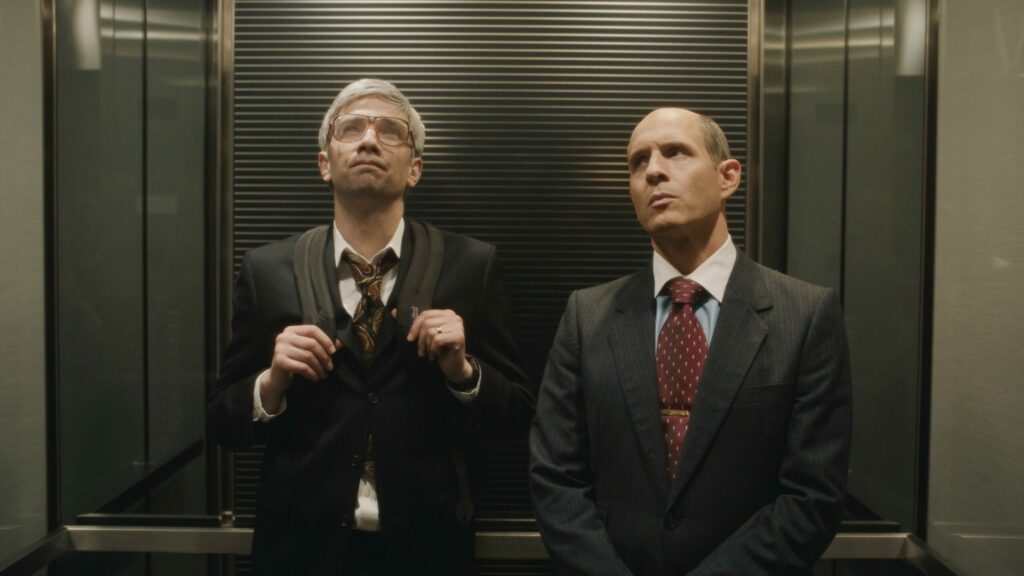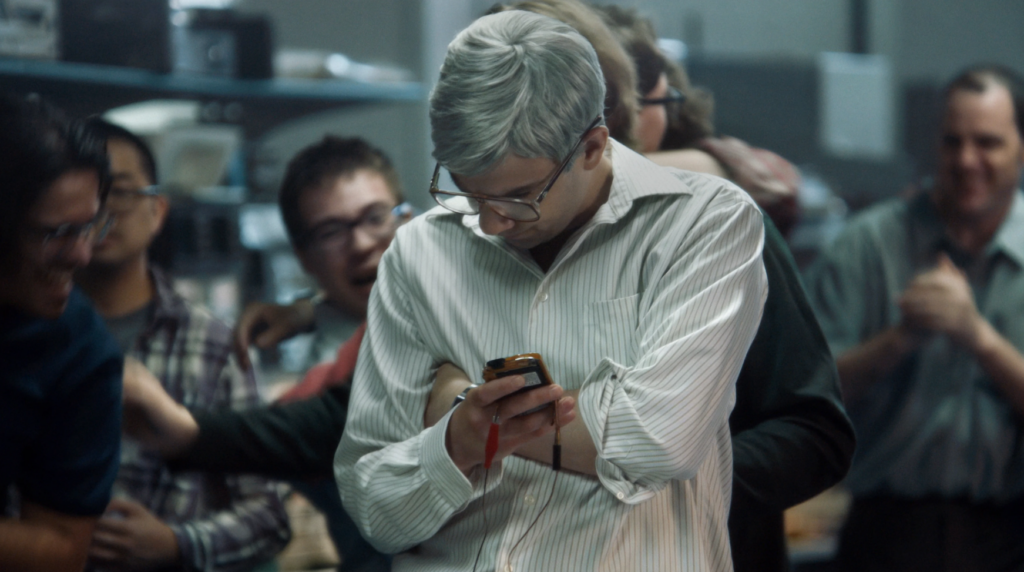The 3 lessons every entrepreneur can learn from the movie Blackberry
In This Article

by Garry Murdock
Imagine the world before mobile technology exploded. It was a place with heavy, clunky phones whose only feature was to make calls (gasp!). There was no mobile internet access or texting or apps. No GPS, no calendar, no saving to the cloud. If you needed to send a document, you emailed it from your desktop computer or faxed it. If you wanted to take a picture or record a video, well then you used a camera or video camera. There were no social media channels to share your thoughts or pictures of your vacation. What did that world look like?
It looked like 1996, when Waterloo company Research In Motion (RIM) was on the verge of bankruptcy. We meet its CEO, Mike Lazaridis (played in the movie by Jay Baruchel), as he and company co-founder Douglas Fregin (played by Matt Johnson) pitch their new product—a hand-held device named the “PocketLink.” The PocketLink is only a prototype, but once complete it will be ready to harness the already existing internet signal for people’s personal use on a mobile phone.
There’s a catch though. Doug explains that nobody has actually figured out how to access that signal, that “it’s like ‘the force’.”
Jim Balsillie—the businessman they are pitching to—is not listening to them. Nor has he seen Star Wars. The internet problem is one he’s just not interested in. In fact, companies all over the world have been trying to solve it without success for quite some time, because the prize is unbelievable profit. In fact, those who do solve it will become some of the wealthiest people on the planet.
Mike and Doug actually have the solution, but they don’t get far enough into the presentation to say so. They are dismissed as Balsillie has to leave for another meeting. Later, in a strange twist of fate, Balsillie loses his job and offers to work for them as Co-CEO. To get in on the ground floor, he pays RIM a lot of money in exchange for a stake in the company.
They take him on. It’s a brilliant move, as with Balsillie’s contacts and presentation skills they sell the phone within a few days.
Blackberry feels slow, but it is not. The years go by a little too fast, and surprisingly, even at a running time of two hours we never learn anything (nothing, in fact) about the main characters lives outside of work.
Fast forward and we find the company has moved out of its strip mall operation into a modern building complex with manned security. Instead of a dozen employees, they now have hundreds, then thousands. New products are launched. Subscribers climb into the tens of millions. Ted Rogers is calling for a lunch. The company buys a jet with a crew on standby.
The movie Blackberry feels slow, but it is not. The years go by a little too fast, and surprisingly, even at a running time of two hours we never learn anything (nothing, in fact) about the main characters lives outside of work. Who are these people? Were they married, did they have kids? Hobbies? Anything? I suspect that for most of them, work was their only driving force. And from their actions I found three things that an entrepreneur running a company—that designs and supplies a product for public consumption—can learn.

Lesson 1: Know your market
At one point in the film we see that RIM is #1 in handset sales, subscriptions, customer retention, attracting new smartphone users, and brand recognition. Research in Motion’s stock soars 400%. To any stockholder, this news must be absolutely thrilling. But it appears RIM got here by being first, not by a brilliant strategy plan.
He goes on to say that his trackpad will be the “dominant navigational device for all mobile devices within the next two years.” No research at all backs up Mike’s statement, just a gut feeling. He is wrong.
You never see RIM conducting a focus group or product surveys. Or Mike even requesting them. For such an intelligent man—he did, after all, crack the wireless internet problem when no one else could—the assumption that this lack of strategy could go on forever was a colossal mistake. Especially when the iPhone arrives on the scene. The iPhone would be the beginning of the end for Research In Motion.
This becomes all too clear when Mike is trying to pitch the Blackberry’s newest feature, a track pad, and the presentation is met with awkward silence. Finally the client asks why RIM doesn’t invent something like the iPhone’s multi-touch screen technology, to which Mike explodes: “It’s the stupidest thing I’ve ever seen in my entire life! I created this entire product class! I created this entire f*****g market!!!” He goes on to say that his trackpad will be the “dominant navigational device for all mobile devices within the next two years.”
No research at all backs up Mike’s statement, just a gut feeling. He is wrong.

Lesson 2: Stay Focused
Mike isn’t the only one to blame for the company’s eventual destruction; Balsillie is also a major contributor. His focus on leasing Hamilton’s Copps Coliseum (and renovating the structure to build his own personal box seats) or attempting to buy the Pittsburgh Penguins are a problem. It’s clear he should be working with Mike on an actual plan for the next Blackberry product.
Regretfully, Mike always seems to be finding out about Balsillie’s actions later, as when Balsillie sells a half million more blackberries than the company’s technology can handle—crashing Research in Motion’s servers and resulting in a PR nightmare. Or when Balsillie (illegally) backdates stock shares to attract talent from around the world to come work for him in Waterloo. That plan works, until the SEC comes calling.

Lesson 3: Don’t cut corners
For the longest time, Mike would not outsource production of Blackberries to China because of quality concerns. But finally, in the end, desperate to keep up with the iPhone, he has the Blackberry’s trademark keyboard removed and sends production of the company’s first all-screen phone—the Blackberry Storm—oversees. But it’s too late. The storm is plagued with problems. Most Storms have to be fixed or returned. Many consider the product to be the biggest disaster in the history of smartphones. Loyal customers lose faith, and lawsuits follow from the phone’s distributors.
The movie is Canadian produced and there’s a treasure trove of Canada’s top actors in the movie in addition to Jay Baruchel and Matt Johnson (who also directed and co-wrote the film).
The talent in this film is outstanding. Jay Baruchel as Mike is almost unrecognizable with his shock of pure white hair, and his performance is understated yet meaningful. He’s played the nervous guy before (it’s really his trademark), but not like this: yes, he gets nervous sometimes. But he’s also a man who is not afraid to stand up when pushed—as when he tells Doug that he no longer needs him, that his best friend and co-founder has outlived his usefulness. Baruchel shows both anger and regret in this scene, and some resignation—because it is all true. Baruchel deserves more recognition for this role.
Balsillie is not a nice guy, ever, and he is played by Glenn Howerton in a scene-stealing performance and as a force to be reckoned with: “I’m from Waterloo where the f*****g vampires hang out!!” he screams. For those hoping, we never see a heart of gold emerge.
Howerton’s fascinating to watch, because most of his performance is based entirely on his facial features: you can practically see the wheels turning in his head. The man is always working, changing tactics, coming up with the next angle, even seconds after failure. He will not, cannot give up.
The movie is Canadian produced and there’s a treasure trove of Canada’s top actors in the movie in addition to Jay Baruchel and Matt Johnson (who also directed and co-wrote the film). It was a delight to see industry legends such as Michael Ironside (Top Gun, Total Recall), Mark Critch (Son of a Critch, This Hour Has 22 Minutes) and Saul Rubinek (Billions, Schitt’s Creek) along for the ride. The film was shot in Waterloo, Hamilton and Toronto.
The company Research in Motion still exists today, although it is now simply called Blackberry. A visit to their website shows that they now specialize in cybersecurity (but no more phones). Mike, Doug, and Balsillie are all long gone. I was left with a feeling that there was so much more to learn about this company and its people, that we couldn’t possibly be privy to all the story’s details in this runtime. However, the CBC has announced that an extended, three-part miniseries version of the film will air this fall. I’ll be tuning into that.
The lessons learned from RIM applies to all companies, old and new
The movie teaches all of us a very important lesson about knowing your market, staying focused, and not cutting corners. Research In Motion was once at the very top of the industry, the envy of all the others. Had they spent a little time learning about their market and consumer expectations, they may still be number one. Considering that they employed some of the best technical minds in the world, I have to ask: What would that have looked like?
Author Bio



